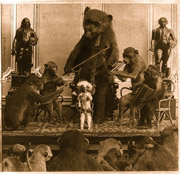Lately I’ve been unable to stop thinking about a quotation from Wittgenstein, “A picture held us captive, and we could not get outside it, for it lay in our language and language seemed to repeat it to us inexorably.” This particular line has been given the old exegete by photographers and lay philosophers and those crazy unwashed undergraduates in humanities departments, and now there’s a book out about Wittgenstein and the New Testament. I know I should read it but I’m really quite tired.
UPDATE: I decided to do some more investigation into that haunting statement of Ludwig Wittgenstein’s, and so I went directly to the most scholarly source on his work, Wikipedia. I discovered some very disturbing things about him: for instance, he is Austrian. His work is primarily in the foundations of logic, the philosophy of language (duh), the philosophy of the mind (whaa?), and the philosophy of mathematics. What you have when you combine these things is a recipe for disaster, because ‘logic,’ ‘the mind,’ ‘language,’ and ‘mathematics’ are all mutually exclusive. They not only cancel one another out, they fight like little children and sometimes build secret apartments in their basements.
All of the Wittgensteins (and by the evidence of one photograph, the family seems to include the young Adolf Hitler, who was, forgive me, a hideously ugly child) were geniuses and could play musical instruments like the angels themselves. Ludwig himself had perfect pitch. Add that to his ‘crazy’ life’s work and my friend, you have a disaster. Such as: three of his four brothers committed suicide. That is 75%. Wittgenstein became interested, after University (or ‘gymnasium’) in studying with Ludwig Boltzmann, who was an expert in aeronautics, but before Wittgenstein could reach him, Boltzmann had committed suicide.
“Whilst in Cambridge, Wittgestein often liked to go to the cinema.”
In 1913 W.,’s father died and left him a fortune, which W. donated anonymously to Austrian writers and artists, including Rilke and George Trakl. In 1914 he went to visit Trakl, as his benefactor, but Trakl committed suicide before Wittgenstein arrived.
After writing one of the greatest works of philosophy in Western history, he did some INTERESTING things, like serve in World War I, and become a Christian, and do those weird things Christians do like decide to work as a janitor instead of a professor, and design a house (although he had no training as an architect), but aaaaaalso it turned out he liked to have some dalliances with the young mens of Vienna, and he chose to do so in a place called the Wiener Prater. I only wish we could be so honest in America, and call our locales of homosexual encounters Weiner Places. I believe Wittgenstein would agree, being a philosopher of language.
There is so much more I could say about him, as he did go on and on and on (although, in all seriousness, he did write one of the most important philosophical sentences in history: “Whereof one cannot speak, thereof one should be silent”), but I’d like to end with this tragic bit of his history. Not as tragic as the suicides, OBVIOUSLY, but sad nonetheless. Part of the reason Wittgenstein spent so much of his life in philosophical agony (it looks like agony to me, anyway) was because of a rare Austrian condition he tried to keep hidden. The only people with whom he shared the truth were Bertrand Russell and the young men of the Weiner Places. In German it is called “Affe-Klauen,” and I present here an example of its ravaging effects.

RIP, Brilliant Gay Monkey Foot.












